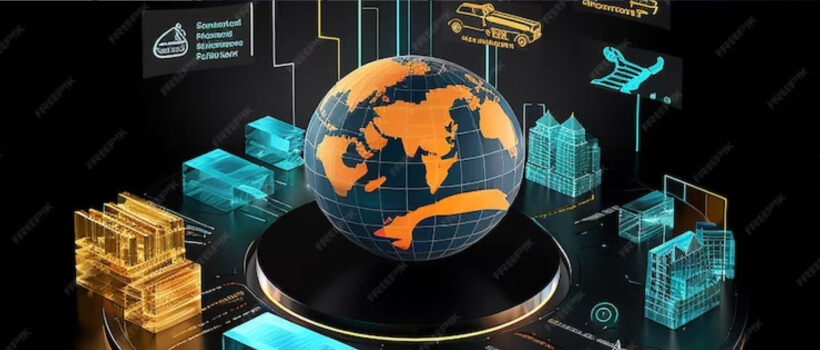 1-800-805-5783
1-800-805-5783 
The global supply chain, the intricate network that delivers goods from raw materials to store shelves, has faced unprecedented challenges in recent years. Disruptions due to geopolitical tensions, extreme weather events, and the need for global health crises have highlighted the urgent need to increase supply chain resilience.
In this context, the integration of product engineering becomes essential for enhancing supply chain resilience. By leveraging advanced engineering techniques and technologies, businesses can optimize product design, streamline manufacturing processes, and improve logistics, thus fortifying the supply chain against unforeseen disruptions.
In other words, businesses must build adaptable and robust supply chains that can withstand unforeseen disruptions and ensure a steady flow of goods. This is when blockchain technology becomes revolutionary.
This blog explores how blockchain technology can be harnessed to ensure supply chain resilience. We’ll explore how blockchain fosters transparency, enhances traceability, and empowers businesses to navigate disruptions more easily.
By the end, you’ll gain valuable insights into how this innovative technology, blockchain for business, can strengthen and safeguard the foundation of our economic well-being – the supply chain.
A. Understanding Supply Chains
The word “supply chain” describes the integrated web of people, businesses, organizations, assets, processes, and technologies that go into getting a good or service from the point of idea to the customer. Although it’s a complicated dance, it’s necessary.
An efficient blockchain in the supply chain ensures that products are delivered on time, reduces expenses, and enables companies to satisfy consumer demands. It serves as the foundation of our economy, affecting everything from the meals on our tables to the clothes on our backs.
B. Blockchain: A Revolutionary Force in Supply Chain Management
Now, consider a method to transform this complex system. Blockchain in supply chain management is a networked ledger that is secure, transparent, and impervious to tampering. This could completely alter the way that supply chains operate.

The modern world thrives on a complex network of interactions called the supply chain. This intricate web connects everything from raw materials to finished products, ensuring they reach consumers efficiently.
However, traditional supply chains face numerous challenges that can disrupt this delicate flow. With the emergence of blockchain for supply chain and blockchain in supply chain management, there’s an opportunity to address these challenges by introducing transparency, security, and efficiency into the supply chain ecosystem.
A. Overview of Traditional Supply Chain Challenges:
B. Explanation of the Benefits of Blockchain in Supply Chain Resilience:
Leveraging blockchain for business can unlock a multitude of benefits that strengthen their supply chain resilience:

A. Case Studies Demonstrating Successful Implementation of Blockchain
To illustrate the practical implications of blockchain in supply chain management, let’s delve into several compelling case studies:
Walmart’s Food Traceability Initiative: Walmart, a global retail giant, harnessed the power of blockchain technology to bolster food traceability and safety within its supply chain.
Using blockchain for the supply chain, Walmart can trace products’ journey from farm to shelf in real-time, ensuring transparency and authenticity. This initiative facilitates swift identification and recall of contaminated products, fortifying food safety and customer trust.
Maersk and IBM’s TradeLens Platform: Maersk, one of the world’s largest shipping companies, joined forces with IBM to develop the TradeLens platform powered by blockchain technology.
TradeLens digitizes and streamlines global trade processes, empowering stakeholders to access real-time shipment data securely. By eliminating manual paperwork and reducing delays, TradeLens amplifies supply chain visibility, efficiency, and collaboration across the maritime industry.
B. Industries and Use Cases Where Blockchain is Making a Difference.
Beyond retail and logistics, blockchain technology is disrupting various industries and revolutionizing supply chain operations.
C. Examples of Companies Leveraging Blockchain for Supply Chain Resilience
To further exemplify the widespread adoption of blockchain for supply chain resilience, consider the following industry leaders:
Through its partnership with Blockchain in Transport Alliance (BiTA), FedEx utilizes blockchain to improve shipment visibility, lower administrative expenses, and lessen the chance of misplaced or damaged packages and lost or damaged packages. As a result, its supply chain operations are more dependable, and customer satisfaction is increased.
Nestlé’s pilot projects, such as using blockchain to trace coffee beans’ journey from farm to cup, enable consumers to access detailed information about product origins and ethical sourcing practices. This promotes trust and accountability in line with Nestlé’s commitment to ethical sourcing and environmental stewardship.

The transformative potential of blockchain in supply chain management is undeniable. However, this technology is still evolving, and exciting new developments are on the horizon.
A. Emerging Trends in Blockchain Technology for Supply Chains
Here are some statistics highlighting blockchain technology’s growing adoption and potential impact in revolutionizing blockchain in supply chain management practices across various industries.
2. A survey conducted by Deloitte reveals that a substantial 53% of executives view blockchain technology as a critical factor in their supply chain operations.
3. The World Economic Forum projects that blockchain has the potential to generate a staggering $365 billion in annual value for the global supply chain industry by 2030.
4. According to a report by Transparency Market Research, the global blockchain supply chain market is expected to grow at a compound annual growth rate (CAGR) of over 50% from 2021 to 2031.
5. Insights from Gartner indicate that by 2023, a significant 50% of large global companies are expected to have integrated blockchain technology into their supply chain operations.
B. Potential Future Applications and Innovations in Supply Chain Management
C. Predictions for the Evolution of Blockchain in Enhancing Supply Chain Resilience
As blockchain technology matures and becomes more widely adopted, we can expect to see significant advancements in supply chain resilience:

Investigating blockchain adoption becomes a strategic necessity as companies negotiate the complexity of contemporary supply chain management to boost resilience and competitiveness. Switching to blockchain technology offers companies a rare chance to transform their supply chain processes and promote increased efficiency, security, and transparency.
Businesses can use blockchain to expedite transactions throughout the supply chain network, confirm authenticity, and efficiently track the flow of goods. By adopting blockchain technology, companies can future-proof their operations, reduce risks, and gain a competitive edge. Businesses must investigate the adoption of blockchain technology to fortify their supply chains and open up fresh opportunities for product development and innovation.